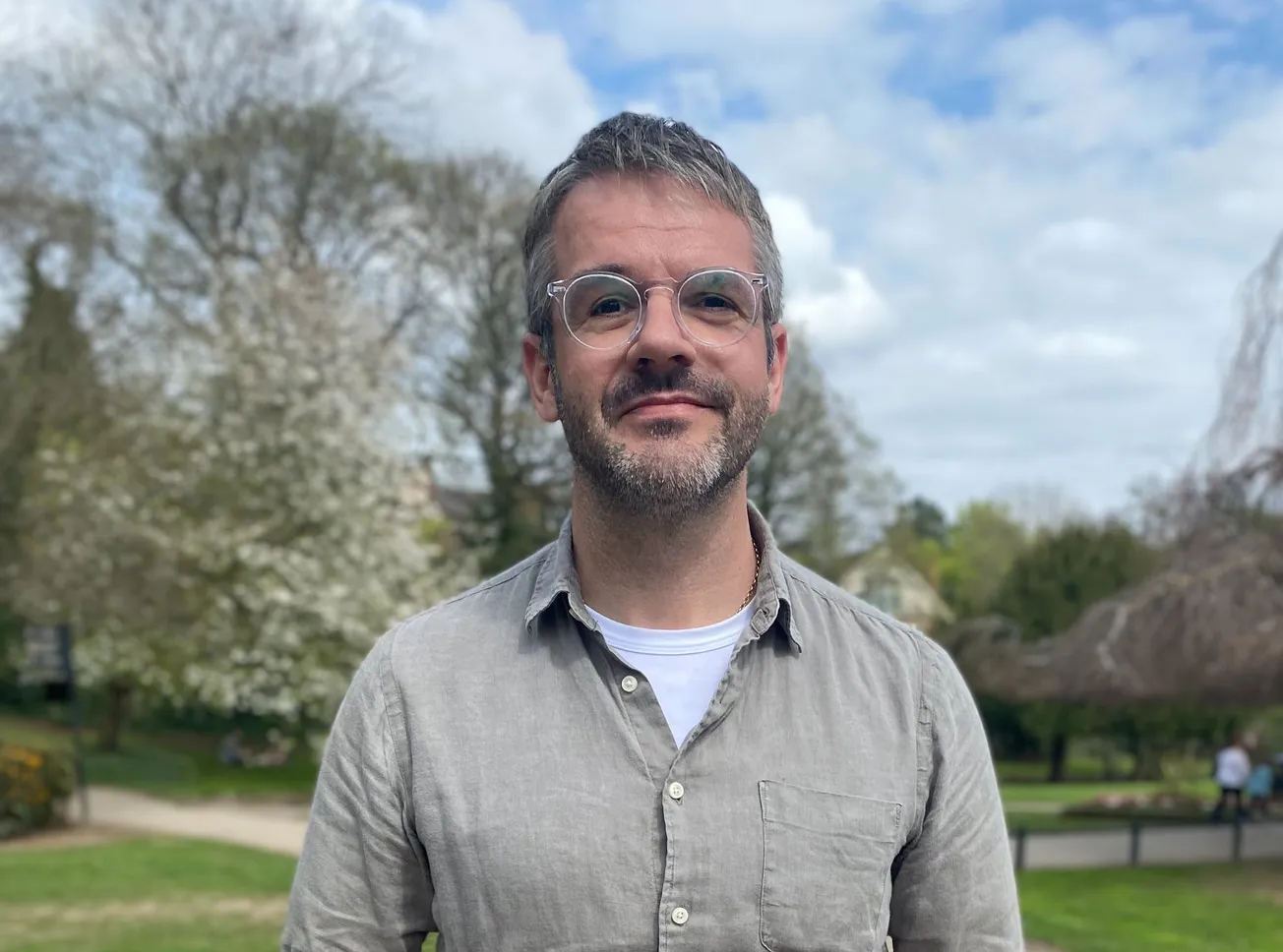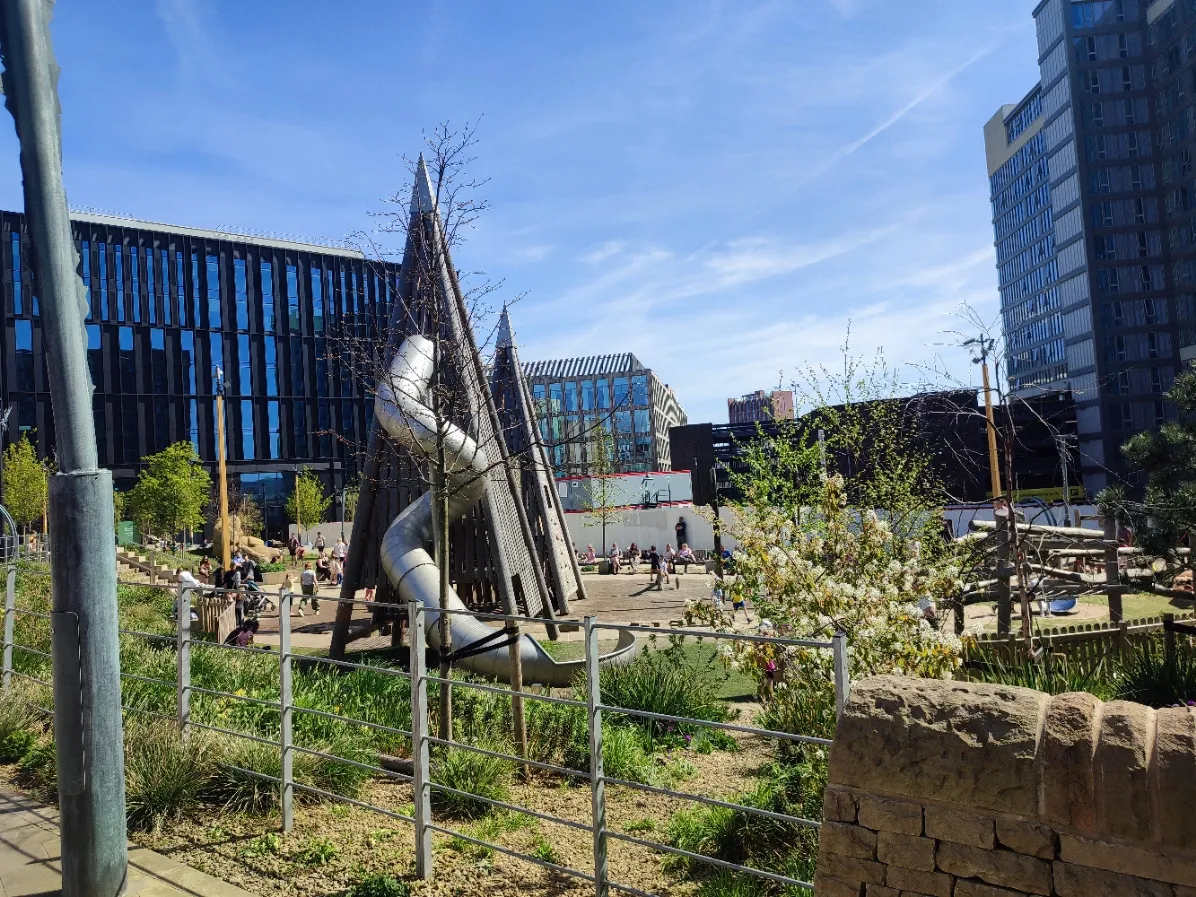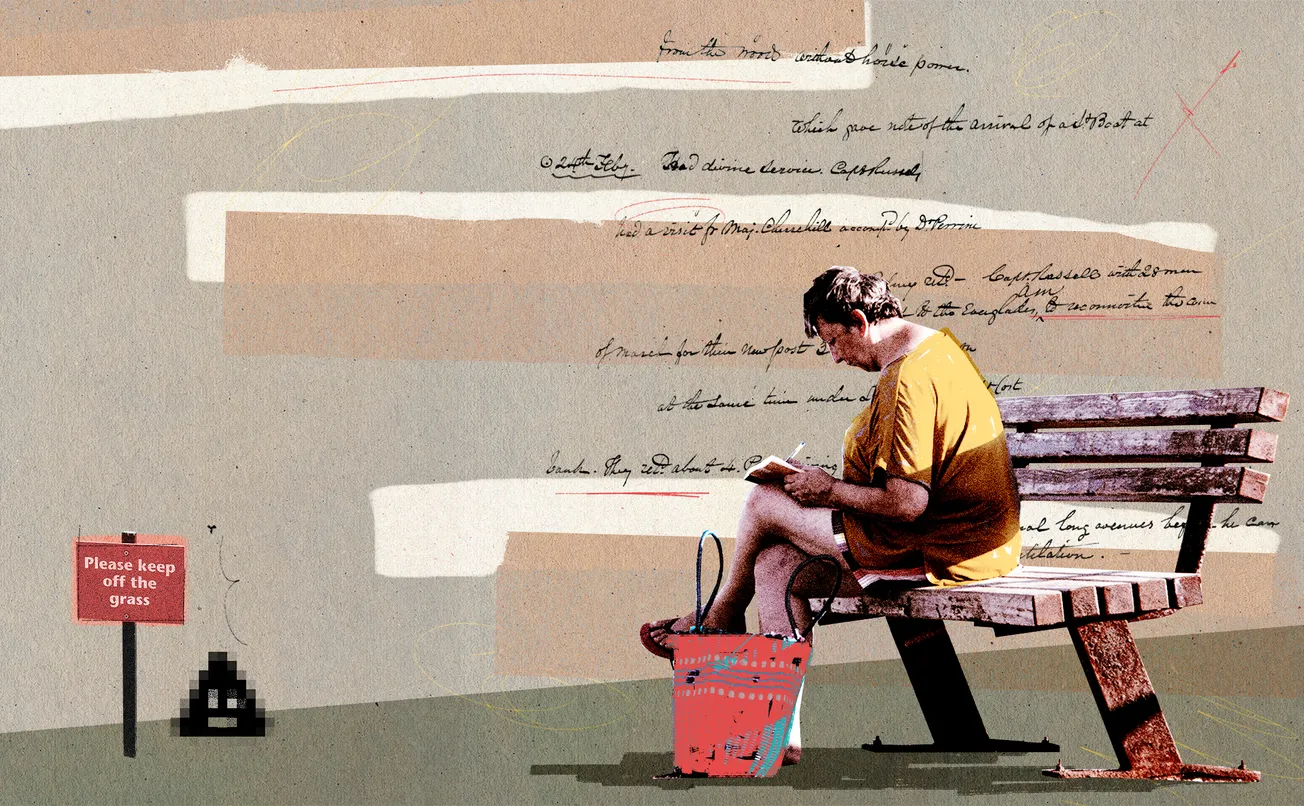Funny coincidence: The man who could be South Yorkshire’s next mayor studied on the same university course as me — Politics and Parliamentary Studies at the University of Leeds. Don’t worry, nepotism isn’t the driving force behind this article: Oliver Coppard and I never met until this interview, he studied there a few years later than I did. The course is unique in offering students a chance to work for politicians in Washington DC. The timing doesn’t quite line up, but I can’t help but wonder if working there, he had ever crossed paths with Barack Obama. While chatting, some of his language reminds me of the former President. He has that same preoccupation with the first person plural: nothing is about him, everything is about we.
Speaking of we — we’ve arranged to meet at Endcliffe Park cafe, on an April day that feels more like summer than spring. He turns up early clutching a wodge of flyers bearing his image and key talking points and a zip-up neoprene document holder. He’s 40 years old, so youngish (younger than me anyway), good-looking and slim with black and grey “salt and pepper” hair and matching tightly-cropped stubble. He currently lives on Brocco Bank, not far from where he grew up just off Ecclesall Road. He went to Silverdale School but transferred to High Storrs for his A-Levels.
He’s only nine or so younger than current mayor Dan Jarvis, but it feels like he’s from a different generation. Labour’s first millennial mayor. He’s also a change of style: think Andy Burnham’s former indie band member vibe rather than suited and booted Westminster type. He arrives dressed in dark jeans and a casual green shirt, accessorised with a pair of clear rimmed spectacles a la Liverpool manager Jürgen Klopp. The glasses have clip-on shades on the front of them which he takes off as we start talking.
He’s kind enough to ask me how The Tribune is going and how I made the journey from politics to journalism and Bolton via Leeds to Sheffield. It’s very clear from the get-go that this won’t be a Paxman-style grilling but that’s not really my style. Some journalists say the relationship between them and politicians should be akin to a dog and a lamppost. I think you catch more flies with honey than with vinegar.

It’s fair to say the election is Coppard’s to lose. Back in 2018, Conservative candidate Ian Walker came second to Dan Jarvis, amassing 50,000 votes and a 26% vote share in the second round. But four years is a very long time in politics. The first time the mayoralty was contested, Labour was in the midst of one of its regular bouts of internecine warfare and the Tories were eagerly eyeing seats in the so-called “red wall” of traditional Labour heartlands, many of which they would win just 18 months later.
Fast forward four years and it’s a different story. Labour is performing better in the polls than it has for years and the Conservatives have been dogged by months of scandal and sleaze. Quite why the 2022 Tory hopeful Clive Watkinson hasn’t appeared at any of the husting events and is yet to give an interview to any media organisation is unclear, but some have suggested the party may want to maintain some level of plausible deniability for a bad result in South Yorkshire and are therefore not campaigning.
So if, as looks increasingly likely, he’s successful in becoming mayor on May 5, what kind of leader will he be? One accusation that has been levelled at him is his lack of experience. Back in 2015, Coppard ran Deputy Prime Minister Nick Clegg very close in Sheffield Hallam, but as of today he’s still had no experience of elected office whatsoever. Sitting in rooms with Andy Burnham (who served in the cabinet in the last Labour government) and Steve Rotheram and Tracy Brabin (who had both been MPs before becoming mayors), is there a possibility he could be a bit lightweight by comparison?
Perhaps unsurprisingly, he bristles slightly at my question, describing experience as “an interesting word”. He points out he’s been active in South Yorkshire politics for 20 years and before that started delivering leaflets for Labour when he was just six years old. He also worked at Barnsley Council and in national government and spent several years at the South Yorkshire Local Enterprise Partnership. “Have I been elected, no,” he says. “But I don’t necessarily think that’s the mark of whether you’ve got experience.”

Perhaps wisely, rather than shy away from it, he leans in, using what some might describe as his lack of experience as a chance to be a different kind of mayor. Part of this is by trying to be transparent and communicating in a different way, and he also wants to try things like citizens’ assemblies on policy areas like climate change. But more than that he says it’s also about his approach to the job. He initially suggests he wants to be “more vulnerable” but decides against it, opting instead for “open to risk”. “I don’t know all the answers and we have to be honest about the fact I can’t solve everything,” he tells me. He’s quick to add that doesn’t mean he won’t try, but he wants to make clear he’s not going to be able to do everything by himself.
One difficulty he has faced is explaining to people what the mayor can (and can’t) do. Last time out, only 26% of people voted in the mayoral election, and current mayor Dan Jarvis has only held the full powers and money of his role for the last two years of his term. Coppard tells me people regularly ask him to “sort out the health service” on the doorstep despite the mayor having no powers over the NHS at all. Making the role relevant to people’s lives will be as big a part of the job as anything else, he says.
One of the reasons devolution in South Yorkshire lagged behind other regions was the combined authority’s turbulent birth. The disagreements between the councils during the negotiations led some to bemoan the region’s parochialism, something that it was alleged continued during the discussions around HS2. But Coppard says the point of a regional mayor is precisely to create that sense of shared endeavour.
“In the manifesto we’ve deliberately shied away from saying we will do this for Doncaster and this for Rotherham because actually what we want to do is make South Yorkshire a better place as a whole,” he tells me. “That sense of identity used to come from our industry and we lost that. How do we create a purpose again so that we are proud of ourselves.”

Coppard says that if devolution is to mean anything, the mayor’s powers will have to grow over time (at the moment they are strictly limited to transport, economic development and regeneration). But rather than ask what powers Whitehall is prepared to give us, he argues we should think more about what we could do better than a government 200 miles away: putting the onus back on them to defend why we’re not allowed to do that. In terms of areas he’d like to see South Yorkshire take more responsibility for, like other Labour mayors he’d like more powers over housing. He also questions whether having a separate South Yorkshire Police and Crime Commissioner will be the right approach going forward.
The biggest prize of all would be responsibility for health and social care like Andy Burnham has in Greater Manchester, but in order to take on more powers, extra capacity will need to be built within the mayoral combined authority not just in terms of numbers but in terms of expertise. Another area he’d like to do more work in is supporting South Yorkshire’s culture, creativity, arts and heritage industries, but he says the MCA isn’t currently structured in a way that would allow it to do that.
The mayor already does have some tax-raising powers, through the mayoral precept, an additional charge he or she can add to people’s council tax bills to fund additional spending. But Coppard isn’t currently keen to use it. He doesn’t want to set up a hostage to fortune by saying never, but given the current cost of living crisis, unless the economic fortunes of South Yorkshire were to improve considerably, he says he can’t foresee a situation where he’d use it. “I couldn’t in good conscience ask people to pay more,” he says.
In the absence of raising more money through the tax system, he’s pinning a lot of his hopes on rolling out a so-called “community wealth building” strategy, following a model first trialled in Preston. These systems try to use the purchasing power of the public sector to ensure that more of the wealth created in a region stays in that region, but economists disagree on how useful they are (some say you end up spending more by using more expensive local suppliers, meaning any savings are lost through added costs).

If such a strategy is to have any effect he will also need to persuade public-sector organisations including the four councils, South Yorkshire Police and the hospital trusts to take part, but Coppard is adamant that the economy has to be about the wellbeing of people and communities rather than just businesses and balance sheets. “The economy has to be for something,” he says. “It has to have a purpose.”
I use the idea of community wealth building as a slightly clumsy segue into talking about internal Labour party politics. The “Preston model” as it has become known was described by some as “Corbynism in action”, but Coppard is generally seen as someone more from the centre-left of the party. Understandably, as someone looking for all the votes he can get, he wants to avoid talk of factionalism, but is there a potential contradiction or conflict there?
“I certainly wasn't Corbyn's biggest fan but there is no one either inside or outside the Labour party who I’ve agreed with 100% on everything,” he tells me. “It's a process of picking the bits you agree with. Someone asked me the other day are you Tony Blair or Tony Benn. I’m neither. Tony Blair got some things right and did some great stuff. Tony Benn had some great ideas. Both of those things can be true.”
He can’t entirely avoid the fact that the Labour party has been an unhappy family for much of the last few years. Coppard (who is himself Jewish) refused to stand again in the Sheffield Hallam constituency in protest at the party’s stance on antisemitism in 2018. A year later he said he was “deeply saddened” when Hallam party members voted (by 40 to one) to reinstate Chris Williamson after the Derby North MP has been suspended for allegedly making antisemitic remarks.

In terms of policy, he says the recent selection process proved that the four candidates (himself, Lewis Dagnall, Jayne Dunn and Rachael Blake) agreed with each other on far more than they disagreed on. But that's not to say they weren't important differences as well. Perhaps the most obvious bone of contention (and one of the biggest issues in the new mayor’s in-tray) was the future of the region’s public transport system.
Notably, Coppard clashed with [left-wing candidate] Lewis Dagnall over public control of the bus system versus public ownership. All the candidates said the current system wasn’t fit for its purpose, but some on the left of the party wanted to move further and faster in bringing the bus system into public ownership. Others (including Coppard) felt that trying to go straight to ownership was a “distraction” from the real challenge of public control.
Expanding on his argument, he’s keen to stress he doesn’t want to overpromise and underdeliver, going back to his point from earlier about being honest about what the mayor will and won’t be able to do. He says the quickest and easiest way of making the bus system better is through public control, but that even doing that successfully will be a massive challenge, as Andy Burnham’s experience in Greater Manchester has proved.
Talking about the bus system he’s at his most animated in our entire conversation, as if he knows that this will be the yardstick by which he will one day be judged. “Chucking ownership into the mix just makes that whole picture harder,” he continues. “Public control is what Andy Burnham, Steve Rotheram and Tracy Brabin are doing so there are models there we can follow. Once we get there we can have a conversation about ownership.”

For some on the left of the party, South Yorkshire’s failure to win funding of £400m from the government to transform the bus network proved the futility of waiting for crumbs from Whitehall that may or may not ever materialise. But Coppard says not getting the money just underlines the pointlessness of setting arbitrary timescales of three, four or seven years to bring buses back under public control. “This isn’t just nice stuff to have, this is fundamental and the government said no,” he tells me. “I don’t control that timetable. It would be the easiest thing to do for me to set out a timescale and then come up with some excuses nearer the time about why it didn’t happen.”
As we’re about to leave I realise I haven’t asked him much about himself. What does he do to enjoy himself or relax? Like me, he doesn’t have time for much other than work at the moment, but he did manage to go for a walk in Dovedale with his best mate from Silverdale recently. He is also a keen cyclist but that has had to take a back seat since the mayoral race began seven months ago at last year’s Labour party conference. Other than that it’s cooking and supporting Arsenal, an affiliation he owes to his dad (former Barnsley Council chief executive Phil Coppard).
Ultimately people will want to know what I think of the man who is very likely to be the next Mayor of South Yorkshire. Obviously, this is just one person’s opinion, but I came away impressed. Coppard comes across as confident, self-assured and willing to talk about what he can’t do as much as what he can. Voters would be wise to adopt an attitude of scepticism about what he — or anyone else — could realistically achieve given the headwinds that are likely to buffet South Yorkshire over the coming four years. But if being inspired by politicians is out for the moment, nor should people be overly cynical either. In the mayor’s role, South Yorkshire finally has a chance to shape its own destiny.
To view Oliver Coppard’s manifesto, visit his website. For a full list of candidates standing to become South Yorkshire Mayor on May 5, see the SYMCA website.

Comments
How to comment:
If you are already a member,
click here to sign in
and leave a comment.
If you aren't a member,
sign up here
to be able to leave a comment.
To add your photo, click here to create a profile on Gravatar.







